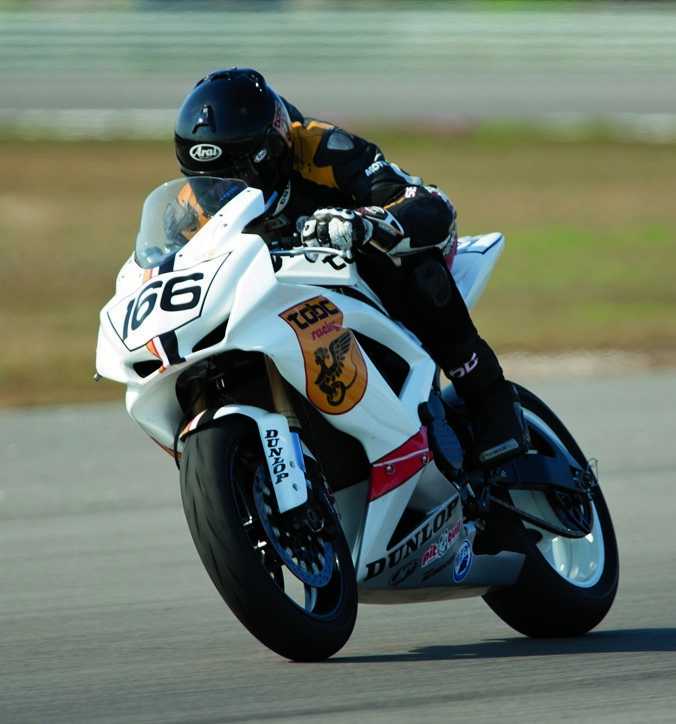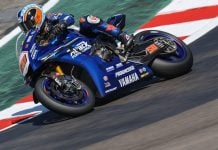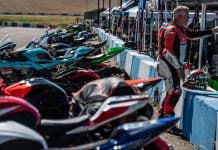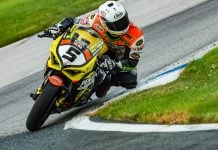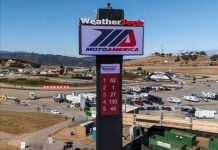Jon Couch has ridden most of his life, but started road racing barely three years ago. Today, he’s got first-place WERA trophies on the awards shelf, has won a Championship or two, employs a professional crew and has a former AMA Pro crew chief organizing the whole shebang. And Couch is trying to not just race, but to do what he can to help grow the sport at the ground level. Without a feeder series, there’s no way for young racers to move into the highest levels of competition, he says, and he’s trying to make it possible for young racers to advance their careers. “Everything we do…is designed to impact the sport in a positive way,” says Couch, 44, a commercial construction company operator out of Annapolis, Maryland. Couch started riding motorcycles when he was nine years old, but didn’t get into racing until past his 40th birthday. “I always had streetbikes, and I restored a number of antique streetbikes, and I always rode those,” he says. But as the first decade of the 2000s wound down, Couch started taking his interest in racing more seriously. “I just really, on a whim, I did some looking around at some different race schools,” Couch says. Couch selected Aaron Stevenson’s Cornerspeed riding school. It was, he says, one of the best decisions he’s made in his racing career. “Starting at Cornerspeed is the reason we are still racing today,” Couch says. “That’s because of the group of people who are there. It’s the quality of the instructors and the relationships that you get that matter. It’s a great group of guys and they really care about the sport. And they care about the riders.” Couch stayed on after school, getting private training from people like Brian Kcraget and Russell Masecar–experienced, seasoned racers who were willing to share their experience with someone new to the sport. “Those guys picked up from there and started teaching me race craft,” Couch says. “Russell’s sort of known on the East Coast as being an SV guy, but he’s also part of the old guard of endurance racing and sprint racing. He really reinforced the importance of helping people out and the importance of the racing community for the future of the sport.” One of the first lessons Couch learned was to get rid of the Suzuki GSX-R750 he’d purchased on eBay and to start riding an SV650. “I never did learn how to ride it (the GSX-R),” Couch says. “Aaron’s suggestion was that an SV650 would teach me how to ride. It was really great advice. It made learning how to handle the bike, everything–it was great. It’s a really easy-to-handle bike. And I’ll tell you this–there’s a lot of really talented guys who are riding SVs. Nothing makes you faster than riding with fast guys.” Couch finished eighth, two laps down in his first-ever race, a WERA Lightweight Solo held at Summit Point in April 2010. The next time out, he was fourth, only one lap down. But running the Solo races–and attending WERA Nationals and watching the endurance races–whetted his appetite for long-distance racing. “You’d watch the endurance events, and–endurance is special. It’s a team event,” Couch says. “There’s a lot going on, a lot to learn, a lot of strategy. It’s the team that works together the best, that prepares the bike the best, that runs the pit the best, that understands the strategy–it’s a fascinating part of the sport.” So at the end of the year, at the WERA GNF, Couch went back to the Cornerspeed folks and asked for some help in getting an endurance team together for the following season. He got the help he asked for, and TOBC Racing ran all seven rounds of the WERA National Endurance Series, racking up a pair of class wins and standing on the overall podium en route to second place in the Lightweight Class Championship aboard a Suzuki SV650. “Which was amazing, (getting an overall podium) on an SV,” Couch says. “A lot of that is Brian–he’s the fastest SV guy that I know. You’ve got some really talented riders on the team, and Russell set up the bikes, and he really did an amazing job. “That endurance racing in 2011 made me twice the racer that I was going into that year. All that time on the bike–it’s the cheapest way to work on race craft. There isn’t any better way to get track time than that. You’re running 50 laps or 65 laps. It’s interesting, that message really doesn’t get out into the paddock the way it should. You’ll have guys who spend just as much or more to run six or eight laps as they could for 35, 40 or 50 laps.” For 2012, Couch stepped it up again. This year, he’s fielding a team in the Lightweight and Mediumweight endurance classes, and is branching out to help young racers as well. “If you look at 2010, it was me and another guy. By the end of 2011, our part of the paddock had somewhere between 15 and 20 people,” Couch says. “You’ve got people coming out to spectate, you’ve got people coming out to help with the bikes, you’ve got people working on the endurance bike and they’re going to race sprints the next day–you might not be able to say that spending time in the pit is the best part of racing, but it’s pretty good! “Now you start to worry about setting up a bike–it’s not something you’re going to do in a weekend. You’re worried about engine work, tires, fuel. And it’s getting expensive. At the end of 2011, we decided that we wanted to go into 2012 in a more sophisticated way, and try to be more supportive of the paddock and of the series. We’re thinking, there’s a lot we can do besides just racing.” So Couch made a commitment to run the winner of this year’s Next Moto Champion-sponsored Moto3 series winner on a full-size bike–GSX-R600 or SV650–in WERA endurance and sprint competition next year. And he convinced former racer and AMA Crew Chief Scott Harwell to ride herd over the operation. “I’m not sure that worked out well for Scott, but it worked out really well for us,” Couch says. “In 2012, the greatest impact came from Scott. As good as our bikes may have been, and as sophisticated as we thought our program was, everything doubled because of Scott. He really understands bike dynamics, how to put together an engine program, and he’s a good race coach. He doesn’t mind putting on leathers and taking guys onto the track and helping them develop as racers. It’s like taking your college professor to work with you–any question you have, you turn around and ask the professor!” It’s indicative of the approach Couch brings to motorcycle road racing. “Everybody who’s in that sort of extended TOBC Racing family have an interest in supporting the sport,” he says. Couch has a lot of other interests–flying his Vietnam-era T-28 piston-powered trainer and counterinsurgency plane, for one–but there’s little doubt as to what has truly captured his attention. “Racing’s the best, man,” he says. “Racing’s the best.”
ATHLETE FEATURE: Jon Couch
ATHLETE FEATURE: Jon Couch
© 2013, Roadracing World Publishing, Inc. By Michael Gougis.
